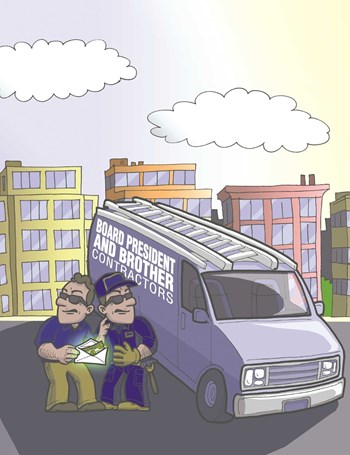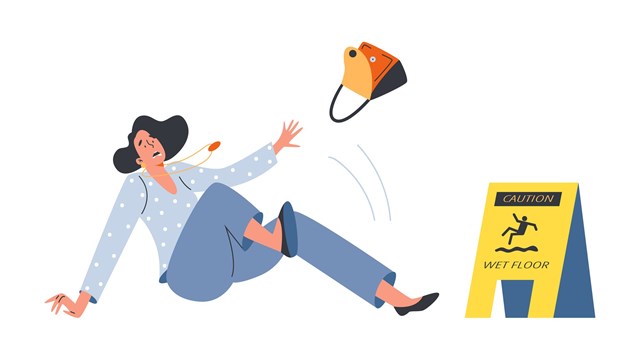
Despite what film noir and gritty nocturnal crime dramas would have us believe, sunny venues and beach vistas are as fertile grounds for criminal activity as dark alleys and deserted piers—especially those typically referred to as “white collar” crimes, like embezzlement and kickbacks. The tendency in Florida for condominium and clustered communities to be governed by property management firms, HOAs, and Community Development Districts (CDDs)—often with multiple and overlapping layers of administration—can set the stage for criminal activities.
Depending on the size of the property, tracking who does what, when, and where could keep a firm of certified public accountants up at night. Of course there are Florida statutes in place governing how associations should be run, but even so, there are ample opportunities for honest confusion and not so honest manipulation.
The Florida Sunshine Law, section 286.011 of the Florida Statutes, provides guidelines on how to keep information flowing correctly, honestly and openly (hence the 'Sunshine' of the law's title.) For example, all meetings must be posted in advance, open to the public and minutes must be taken and available for public inspection. CDDs must adhere strictly to this statute but, HOAs and COAs can often take a more flexible interpretation.
Violation of The Sunshine Law is a second degree misdemeanor which carries fines, attorney’s fees, removal from office and possible jail time.
It goes without saying that working closely with an experienced and reputable property management firm is a board's first line of defense in preventing criminal activity. Such a firm will have excellent recommendations and experience on how to identify and prevent any unsavory activity.
The Self-Managed Association
If hiring a property management firm is not in the budget—or if your association is a small one with just a few units—there is still help available. David Weis is the general manager at HOA Property Solutions LLC in Wesley Chapel, just a few miles north of Tampa. A former licensed Community Association Manager (CAM), Weis has also served on the boards of several communities while living in those communities. “I know this business from both sides,” he says, “from a resident’s perspective and a property management perspective.”
The questionable activity Weis has most often observed has been associated with preferential treatment shown to vendors. “The hiring of contractors, handymen, or lawn maintenance crews based on family or friendship rather than performance or fee structure is the most prevalent questionable activity,” Weis explains. “While kickbacks may be hard to prove, this favoritism is always uncovered.”
On at least one occasion Weis uncovered a case of preferential treatment when he became president of his neighborhood HOA. As he reviewed the records, the bottom line on the lawn crew revealed the company was more expensive and inferior. “Why did they get this bid?” he asked. A quick check on the Internet answered his question. The former HOA president was related to the lawn business owner!
Weis thinks it is wise to encourage and involve homeowners in community meetings as often as possible. He also relies on the local sheriff or police for information in his own zip code and the surrounding area, whether it is his personal property or a property he is assisting. Weis uses www.sunbiz.org for additional detailed information to research properties in his county.
A full 60 percent of properties in his area are self-managed, and companies like Weis’s provide support for all-volunteer boards. “The biggest need is usually enforcement of deed restrictions,” he explains. As he tours the property, it is also easy to spot if things are amiss; however Weis recommends any criminal activities be reported to law enforcement rather than taking them on personally. He also recommends a full risk management assessment for any property he consults with. “If you know what and where the risks are, you can be prepared to prevent or minimize problems.”
The Risk Management Assessment
Jeff Hanneken, vice president with Paragon Risk Management, Inc., provides the type of risk assessments Weis is referring to. Hanneken is frequently called in to evaluate the physical layout of condo properties and to determine trouble spots to head off any criminal activity before it happens. His inspections reveal risk and/or exposures with a bend towards education and prevention, and he leaves his clients with a detailed checklist for both the internal and external exposures to risk.
Hanneken also encourages boards to review who comes on the property and for what reason. Vendors, construction workers and groundskeepers are pretty much a given but volunteers, party planners, and annual garage sale organizers/shoppers may also be part of the regular community traffic.
Internally, Hanneken instructs boards of directors how to recognize “fraud and illegitimate behavior” and how to protect records from a breach of data or unscrupulous activity. He provides valuable information on liability coverage in all areas up to and including the directors and officers on the board.
Externally, Hanneken states, “I am amazed at what a directional sign or proper lighting can do to minimize risk and improve safety. “Video cameras are also an option properties may want to consider.”
Take The Money … and Run
A risk assessment could have saved a small condominium community north of Clearwater, a still-unspecified amount of community funds. The current HOA president and property is not identified since the matter is under investigation, but the problem appears to have developed when the past HOA president allowed the property manager to sign his name on association checks. At some point, the property manager began to write himself monthly checks. No one was watching until the former president moved off the property and the new president reviewed the records. A “Miscellaneous Administration Charge” appeared monthly and could not be accounted for. When pressed for details, the property manager disappeared and the property management company went out of business. The entire community has paid the price for sloppy and fraudulent management. Any “miscellaneous charge” should be a red flag warranting investigation.
The Dedicated Volunteer
Not far from the red-flagged property is another small gated community with a very different story. While the news is good in this neighborhood, the HOA president asked to remain anonymous in order to protect the privacy of the residents. The president retired and moved to his newly developed community nearly a decade ago. He immediately became involved in community government. His neighborhood is one of several, all separately gated and managed by separate HOAs. The neighborhoods together form a large development that has an overall HOA and a CDD. He has maintained the presidency for his own community, and also served as vice president for the development HOA. He resigned the VP position to take a director’s seat on the CDD and other administrative positions, and attends monthly meetings and workshops to support his various positions.
His dedication is matched by his continuity of service; Every evening, he drives around his community and notes any potential problems or violations. One evening he recently encountered a group of young men, all dressed in black and wearing hooded sweatshirts. When they realize he had spotted them, they scattered. The police were notified, but no one fitting the description was found. However this regular routine of diligence probably prevented an incidence of vandalism or theft. Two years ago, an unlocked car was burglarized when the garage door was accidentally left open; part of the stolen loot was a firearm.
Residents are encouraged to keep garage doors down at all times, and to keep any vehicles in their driveways locked, and if they see problems to call the police immediately. Monthly community newsletters and a community website remind residents to be good citizens. This dedicated volunteer receives no salary for his efforts, but his community is attractive, crime is low, and property values remain better than average.
Professional Property Management
In Hollywood, Florida, Bill Worrall manages property for The Continental Group. He advises HOAs to focus on the basics and review records monthly to prevent being blindsided by errors or fraud. Maintenance and security logs should always be part of that review. “Determine who has access to the property and for what reason.” Databases must be kept up to date and in synch to include residents, guests and visitors as well as vendors and contractors. If the community is gated and there is a separate emergency or visitor’s gate code, Worrall recommends it be changed monthly, or at least periodically with monthly reviews.
He followed his own advice, and used the above approach to expose a recent brush with true crime. The Continental Group took over a property that was bank-owned, and Worrall began the process of reviewing records and logs. The property was gated, with a guard on duty. Anyone visiting the garden style condos had to check in.
As previously stated, hiring an experienced and reputable property management firm is the first recommended course of action towards preventing criminal activity. Worrall recognized several red flags, and soon discovered an active prostitution ring operating on the property. This cyber-savvy bunch of criminals had even set up their own website. He tightened security on his end and again followed his own recommendations. “Always call the police and never confront anyone,” he insists, “you just don’t know who you are approaching.” If in doubt as to whether it is a police matter, then call your property management company.”
Worrall’s final bit of advice is this. “Attend your community meetings and learn the trends and issues that may affect your area.”
The bottom line is to always keep a sharp eye on the goings-on in your community but leave the enforcement to the experts. Great advice for everyone.
Anne Childers is a freelance writer and a frequent contributor to The South Florida Cooperator.






Leave a Comment